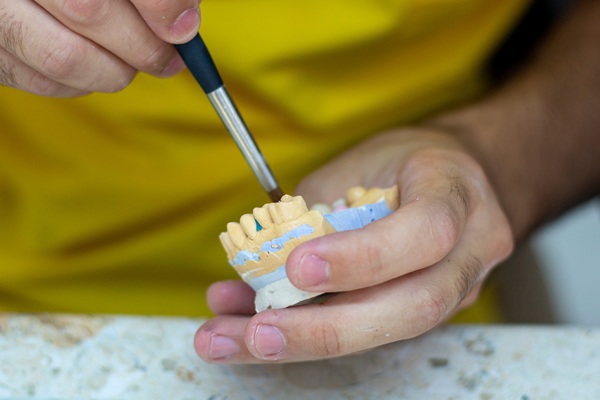Treating Gum Disease With Laser Dentistry

Periodontal disease, i.e., a bacterial infection of the gums, may be treatable with laser dentistry. Gum disease can often prove very serious. Left unchecked, the bacteria can spread to other, more vital organs, including the brain and eyes. This may cause serious complications such as blindness.
Research suggests that laser dentistry may be at least as effective at treating periodontal disease as traditional surgical methods. It offers potential benefits to the patient as well. Nevertheless, because the technology is new, the American Academy of Periodontology has been cautious in recommending it, citing a need for further research to determine its effectiveness.
How does laser dentistry work on gum disease?
Treatment for periodontal disease involves cleaning and removing the area of infection from around the roots of the tooth. There are two traditional methods of accomplishing this. A gum flap procedure involves surgically cutting and folding back the tissue of the gums to expose the roots of the tooth. The roots are then cleaned deeply to remove the bacteria, and the gum tissue is replaced and repaired with sutures.
In addition, there is a nonsurgical method of treating gum disease called scaling and root planing. It involves cleaning the surfaces of the tooth down to the root and smoothing any rough spots on the roots that could provide bacteria a place to grow. It is not necessary to flip back the gum tissue because it may have already receded.
Laser dentistry also works to precisely remove plaque, tartar and bacteria that have built up on the roots of the teeth. It can smooth down the roots and remove the areas of gum tissue that have become infected while leaving the healthy sections intact. The heat from the laser works to kill any bacteria that remain.
What are the potential benefits of laser dentistry for gum disease?
Laser treatment for gum disease can offer several advantages, especially for people who are not good candidates for surgery due to underlying medical issues.
1. Minimally invasive
Laser treatment does not require the dentist to cut into the gums surgically. This eliminates the need for sutures, shortens the recovery time and typically means less pain and discomfort for the patient.
2. More precision
Laser treatment can precisely remove the areas of diseased tissue. This leaves the healthy places intact.
3. Less bleeding
Because the heat from the laser kills bacteria as it removes diseased tissue, less bleeding may occur during the recovery period. Laser treatment also helps eliminate other post-procedural complications, such as swelling.
4. Shorter treatment
Compared to surgery, laser treatments themselves are shorter. Patients also require fewer follow-up visits after laser treatment compared to surgery. Because of this, laser treatment is also frequently less expensive than surgery, and insurance may cover it.
Conclusion
As with any procedure, there may be risks involved in using laser dentistry to treat periodontal disease. However, the process also provides a number of advantages. For more information, or to answer specific questions and address concerns, contact an experienced dental professional today.
Request an appointment here: https://www.lilburnfamilydentistry.com or call Lilburn Family Dentistry at (770) 800-0178 for an appointment in our Lilburn office.
Check out what others are saying about our services on Yelp: Read our Yelp reviews.
Recent Posts
Dental crowns reinforce a decayed or damaged tooth, restoring its function and beauty. These are just two of the many benefits of crowns. For instance, they also require minimal aftercare. If you are dealing with a broken or root canal-treated tooth, consider this popular dental restoration.Dental crowns can restore a variety of dental conditions. They…
Dental implant restorations have transformed dentistry by offering a versatile and reliable solution for replacing missing teeth. This approach to smile restoration seamlessly combines durability and natural aesthetics, restoring oral function and appearance. Because implant restorations can support different types of dental prosthetics, they address a variety of needs while preserving oral health. Understanding the…
Dental crowns are restorations that can address a range of dental issues, from severely damaged teeth to protecting a tooth after a root canal. They help preserve oral health and enhance a smile's appearance. In addition to being versatile, they are available in different materials, which can be helpful for individuals who want options.Dental crowns…
A broken tooth is a common dental issue that can happen for many reasons, such as accidents, biting into something hard, or untreated tooth decay. Whether a dentist can save a broken tooth or needs to remove it depends on how severe the damage is and how quickly patients seek treatment. While modern dental techniques…


